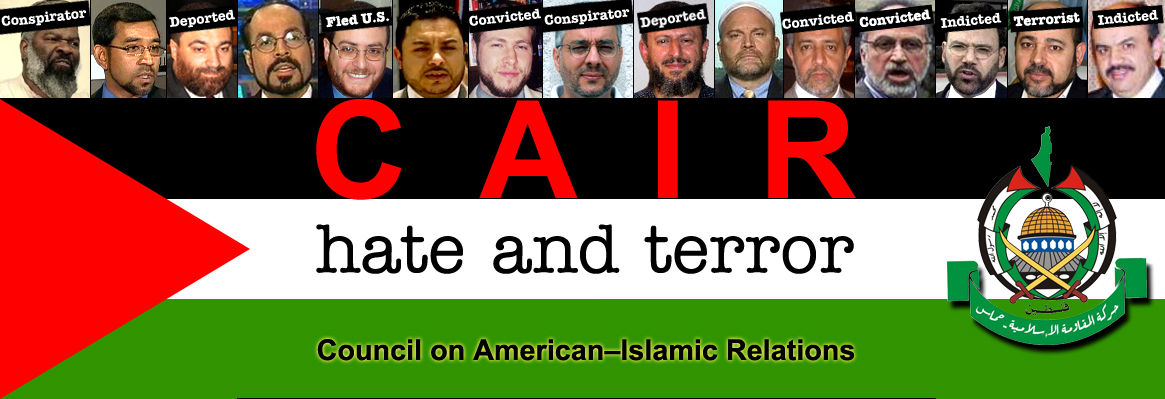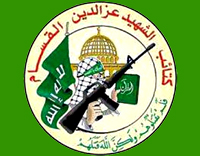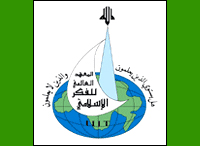Sunday, April 20, 2008
CAIR Chairman Parvez Ahmed (left), convicted Palestinian Islamic Jihad terrorist leader Sami Al-Arian (right), and some PIJ “militants” liberating an unarmed Palestinian.
If you currently visit the CAIR website, you’ll notice that 3 of the 5 rotating highlighted articles concerns jailed Palestinian Islamic Jihad North American leader Sami Al-Arian. One of those articles is an editorial co-authored by CAIR board chairman Parvez Ahmed, “Sami Al-Arian Must Be Freed”.
Try as much as you like, you will be hard pressed to find out from the CAIR website exactly why Sami Al-Arian remains in jail, let alone what put him there in the first place. Al-Arian is in prison because he is obstructing justice by refusing to testify in response to a federal grand jury regarding his knowledge of terrorist support activities in the US. The only man keeping Al-Arian in jail is Al-Arian himself, as noted recently by the Washington Post. All he has do to is appear before the grand jury and tell the truth. Then again, telling the truth is something he has had extreme difficulty with.
But as I said, nothing in Parvez Ahmed’s editorial or anywhere on CAIR’s website can you find out exactly what Sami Al-Arian pled guilty of. At the time of his plea deal, the Tampa Tribune briefly described what Al-Arian pled guilty to: “an admission that he continued to aid relatives and colleagues associated with PIJ after it was designated a terrorist group.”
In the actual plea agreement filed with the court and signed by Al-Arian (which he also initialed on every page), we read in full the extent of his terrorist crimes and lies:
9. Factual BasisAll of this was signed off by Al-Arian. So is Sami Al-Arian a “political prisoner”, as CAIR’s Parvez Ahmed claims; or is he the terrorist leader imprisoned after admitting to his crimes in support of PIJ and his continued obstruction of justice by refusing to testify against his terrorist co-conspirators still operating in the US?Defendant is pleading guilty because defendant is in fact guilty. The defendant certifies that defendant does hereby admit that the facts set forth below are true, and were this case to go to trial, the United States would be able to prove those specific facts and others beyond a reasonable doubt:
FACTS
- During the period of the late 1980s, and early to mid-1990s, defendant Al-Arian was associated with several organizations, including the Palestinian Islamic Jihad. Defendant Al-Arian knew that co-defendants Ramadan Abdullah Shallah (Shallah), Bashir Musa Mohammed Nafi (Nafi) and Mazen Al-Najjar (Al-Najjar) were also associated with the Palestinian Islamic Jihad.
- On or about January 23, 1995, President William Clinton issued Executive Order 12947, which declared a national emergency regarding the grave acts of violence committed by foreign terrorists that disrupted the Middle East Peace Process. Executive Order 12947 prohibited certain transactions, including the making or receiving or any contribution of funds, goods, or services, to or for the benefit of organizations and individuals who were declared “Specially Designated Terrorists.” Executive Order 12947 also made unlawful any transaction that evaded or avoided, or had the purpose of evading or avoiding, or attempted to violate, any of the prohibitions set forth in the Order. By January 24, 1995, the United States had designated the Palestinian Islamic Jihad, Sheik Abd Al Aziz Awda and Fathi Shiqaqi as Specially Designated Terrorists. Later that year, in November, 1995, the United States designated Ramadan Shallah as a Specially Designated Terrorist.
- Defendant Al-Arian performed services for the PIJ in 1995 and thereafter.
- Such services included filing for Immigration benefits for individuals associated with the PIJ, hiding the identities of individuals associated with the PIJ, and providing assistance for an individual associated with the PIJ in an United States Court proceeding. The services are described with more particularity in the following paragraphs.
- On or about February 6, 1995, defendant Al-Arian had a telephone conversation with a co-conspirator and discussed the recent Presidential Executive Order against terrorists.
- Defendant Al-Arian was aware that the PIJ achieved its objectives by, among other means, acts of violence.
- On or about August 25, 1995, defendant Al-Arian filed a visa renewal petition with the INS on behalf of co-defendant Nafi.
- On or about September 1, 1995, co-defendant Al-Najjar wrote a $5,000 check drawn on the Muslim Women Society (MWS) account, payable to World and Islam Studies Enterprise (WISE) which was deposited into the WISE account.
- On or about October 25, 1995, co-defendant Al-Najjar executed an Affidavit filed with the INS in support of Nafi’s alien employment petition. In the Affidavit, Al-Najjar stated that he and defendant Al-An’an had sufficient financial means to fund Nafi’s salary. Al-Najjar further stated that in 1993, he contributed $36,000 to WlSE and that in January and February 1994, he had in excess of $50.000 available to support the operations of WISE.
- On or about October 30, 1995, in the early morning hours, defendant Al-Arian received a telephone call from a co-conspirator in which the coconspirator asked whether defendant Al-Arian had heard that Fathi Shiqaqi had been killed. Defendant Al-Arian indicated that he had heard and then refused to talk. Later that day, he had a telephone conversation with Al-Najjar. Defendant Al-Arian indicated he wanted to meet with Al-Najjar.
- On or about October 30, 1995, co-defendant Nafi made a telephone call to defendant Al-Arian. Nafi whispered during this conversation and defendant Al-Arian said the matter had been complicated and inquires had begun.
- On or about October 30, 1995, defendant Al-Arian had a telephone conversation with a journalist with The St. Petersburg Times. When the journalist asked about Shallah being named the Secretary General of the PIJ, defendant Al-Arian falsely stated that Shallah’s name must have been mixed up with someone else and falsely stated he only knew Ramadan Abdullah Shallah as Ramadan Abdullah. Later, defendant Al-Arian had another telephone conversation with a journalist with The St. Petersburg Times. During this conversation, defendant Al-Arian expressed shock and surprise and falsely stated there was nothing Shallah had done while at WlSE to indicate any political affiliation. Defendant Al-Arian falsely stated that Shallah was not involved in any political activities while at WISE and that Shallah had been engaged in only scholarly work.
- On or about October 31, 1995, defendant Al-Arian and codefendant Al-Najjar caused a facsimile to be sent from WlSE which explained its mission and its experience with Shallah and falsely denied any knowledge of Shallah’s association or affiliation with any political group in the Middle East.
- On or about August 7, 2000, defendant Al-Arian, who was in the Middle District of Florida, had a telephone conversation with co-defendant Nafi, who was in England, about utilizing a contact of Nafi’s in Egypt to obtain travel documents for Al-Najjar. They then spoke about Nafi’s problems with his immigration status in the United States. Then they had a coded conversation about the account to which Nafi had sent money to assist in the defense of co-defendant Al-Najjar’s ongoing INS proceeding.
- On or about August 8, 2000, defendant Al-Arian, who was in the Middle District of Florida, called a co-conspirator, who was outside the State of Florida. When defendant Al-Arian asked co-conspirator if any thing was deposited in his account or his wife’s account, the co-conspirator replied there were “ten shirts” (referring to a sum of money). Defendant Al-Arian then directed the co-conspirator to send nine of them to the account of another co-conspirator.
- Later in the day on August 8, 2000, defendant Al-Arian, who was in the Middle District of Florida, had a telephone conversation with co-defendant Nafi, who was outside the State of Florida, and told Nafi that the issue of “the magazines” (referring to a sum of money) was resolved, but the travel document had not been received from Egypt. They then discussed utilizing the press to support Al-Najjar in his INS hearing by setting up an interview with Abd Al Aziz Awda (Awda) to show that he had the permission of the Israelis to reside in the Gaza Strip. Defendant Al-Arian then asked Nafi for Awda’s telephone number. Nafi told him to call back the next day to get the number. Additionally, they discussed Nafi’s response to allegations in the press that he was a member of the PIJ.
- On or about August 8, 2000, defendant Al-Arian directed codefendant Hatem Naji Fariz (Fariz) to arrange a newspaper interview with Awda.
- On or about August 9, 2000, defendant Al-Arian and co-defendant Fariz had a telephone conversation about causing one or more newspaper articles to be written on Awda. They desired to utilize these articles in the INS hearing regarding Al-Najjar and wanted them to portray Awda as a religious figure with no relation to the PIJ.
Sami Al-Arian has admitted to his terrorist crimes. Time for CAIR to come to terms with them as well. Sami Al-Arian is no freedom fighter or political prisoner; he’s a terrorist thug and a coward for repeatedly refusing to tell the truth about his crimes. Something officials at CAIR can readily identify with.
Thank you.
Labels: CAIR Terror, Parvez Ahmed




















